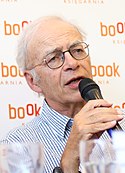Peter Singer Quote
I argued against the view that the only obligation we have to strangers is to avoid harming them; but even if we were to take that view, the facts of climate change would demonstrate clearly that we are harming hundreds of millions, perhaps billions, of the world's poor.
Peter Singer
I argued against the view that the only obligation we have to strangers is to avoid harming them; but even if we were to take that view, the facts of climate change would demonstrate clearly that we are harming hundreds of millions, perhaps billions, of the world's poor.
Tags:
global warming
Related Quotes
We should always be clear that animal exploitation is wrong because it involves speciesism. And speciesism is wrong because, like racism, sexism, homophobia, anti-semitism, classism, and all other for...
Gary L. Francione
Tags:
ableist, abolition, abolitionist, ahimsa, animals, classism, climate change, education, exploitation, extinction
One of the difficulties in raising public concern over the very severe threats of global warming is that 40 percent of the US population does not see why it is a problem, since Christ is returning in...
Noam Chomsky
Tags:
advancement, apocalypse, atheism, bible, climate, climate change, consensus, deism, global warming, ignorance
So it is always preferable to discuss the matter of veganism in a non-judgemental way. Remember that to most people, eating flesh or dairy and using animal products such as leather, wool, and silk, is...
Gary L. Francione
Tags:
ableist, abolition, abolitionist, ahimsa, animals, classism, climate change, easy, education, exploitation
Ethical veganism results in a profound revolution within the individual; a complete rejection of the paradigm of oppression and violence that she has been taught from childhood to accept as the natura...
Gary L. Francione
Tags:
ableist, abolition, abolitionist, ahimsa, animals, classism, climate change, education, exploitation, extinction
Science is not a democracy. Therefore to try to pass of global warming as real just because "98% of scientists say they agree" makes no sense at all. If 98% of psychiatrists said that all mentally ill...
Rebecca McNutt
Tags:
agree, bridge, climate change, democracy, earth, environmentalism, global warming, heretic, hippie, jump
I would remind you to notice where the claim of consensus is invoked. Consensus is invoked only in situations where the science is not solid enough. Nobody says the consensus of scientists agrees that...
Michael Crichton
Tags:
9 11, bisphenol a, bpa, consensus, darwinism, evolution, excitotoxins, fluoride, global warming, id
About Peter Singer
Peter Albert David Singer (born 6 July 1946) is an Australian moral philosopher who is Emeritus Ira W. DeCamp Professor of Bioethics at Princeton University. Singer's work specialises in applied ethics, approaching the subject from a secular, utilitarian perspective. He wrote the book Animal Liberation (1975), in which he argues for vegetarianism, and the essay "Famine, Affluence, and Morality", which argues the moral imperative of donating to help the poor around the world. For most of his career, he was a preference utilitarian. He revealed in The Point of View of the Universe (2014), coauthored with Katarzyna de Lazari-Radek, that he had become a hedonistic utilitarian.
On two occasions, Singer served as chair of the philosophy department at Monash University, where he founded its Centre for Human Bioethics. In 1996, he stood unsuccessfully as a Greens candidate for the Australian Senate. In 2004, Singer was recognised as the Australian Humanist of the Year by the Council of Australian Humanist Societies. In 2005, The Sydney Morning Herald placed him among Australia's ten most influential public intellectuals. Singer is a cofounder of Animals Australia and the founder of the non-profit organization The Life You Can Save.
On two occasions, Singer served as chair of the philosophy department at Monash University, where he founded its Centre for Human Bioethics. In 1996, he stood unsuccessfully as a Greens candidate for the Australian Senate. In 2004, Singer was recognised as the Australian Humanist of the Year by the Council of Australian Humanist Societies. In 2005, The Sydney Morning Herald placed him among Australia's ten most influential public intellectuals. Singer is a cofounder of Animals Australia and the founder of the non-profit organization The Life You Can Save.
